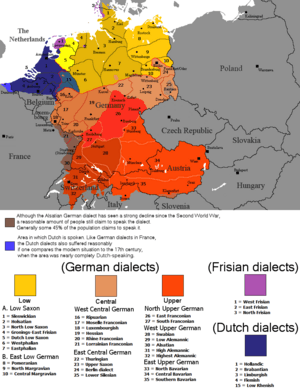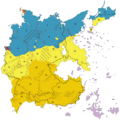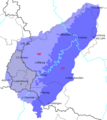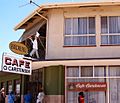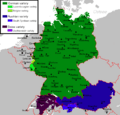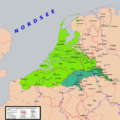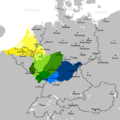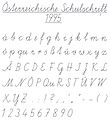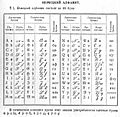German language facts for kids
Quick facts for kids German |
|
|---|---|
| Native to | Primarily in German-speaking Europe, as a minority language and amongst the German diaspora worldwide |
| Native speakers | Standard German: 90–100 million (2005–2010) all German: 120 million (1990–2005) L2 speakers: 80 million (2006) |
| Language family |
Indo-European
|
| Early forms: |
Old High German
|
| Writing system | Latin (German alphabet) German Braille |
| Official status | |
| Official language in | (official and working language)
|
| Recognised minority language in | |
| Regulated by | No official regulation (German orthography regulated by the Council for German Orthography (Rat für deutsche Rechtschreibung)). |
The German language (German: Deutsch or (die) deutsche Sprache) is a West Germanic language in the Indo-European language family.
It is spoken in Germany, Austria, Switzerland, Liechtenstein and Luxembourg; natively by around 100 million people. It is the most widely spoken mother tongue in the European Union. There are some people who speak German in Belgium and in the Netherlands, as well as in France and Northern Italy. There are people who speak German in many countries, including the United States and Canada, where many people emigrated from Germany. In Eastern Europe, too, in Bulgaria, Romania, Russia, etc.
German is a part of the West Germanic language family (a group of languages that are similar) and is much like English and Dutch. A lot of the vocabulary in German is related to English, but the grammar is more complicated. German has a system of cases, and when helping verbs are used, the main part of the verb must be moved to the end of the sentence. For example, "Someone has stolen my car" is Jemand hat mein Auto gestohlen (Someone has my car stolen) or, "Someone called me last night" is Jemand hat mich letzte Nacht angerufen (Someone has me last night called).
In German writing, every noun must start with a capital letter. English and Danish also did this long ago, but not now. Today, German is the only language that has this rule.
While German is an official language in Switzerland, the Swiss dialect of German is difficult for native speakers from Germany, and even for Swiss who are not native to speaking German, to understand. One reason why the dialects are still so different today is that even though Switzerland adopted Standard German, mostly as a written standard, German Swiss in WWII wanted to separate themselves from the Nazis by choosing to speak the Swiss dialect over the standard dialect. Swiss German also has some differences in writing, for example, the letter ß, which is only seen in German, is always replaced by ss.
Contents
Dialects
- Alsatian
- Bavarian dialect
- Franconian Dialect
- Kölsch
- Low Saxon
- Swiss dialect
- Mannheimerisch dialect
- Palatinate German
German loanwords in the English language
English has taken many loanwords from German, often without any change of spelling (aside from, often, the elimination of umlauts and not capitalizing nouns):
| German word | English loanword | Meaning of German word |
|---|---|---|
| abseilen | abseil | to descend by rope / to fastrope |
| Angst | angst | fear |
| Ansatz | ansatz | onset / entry / math / approach |
| Anschluss | anschluss | connection / access / annexation |
| Automat | automat | automation / machine |
| Bildungsroman | bildungsroman | novel concerned with the personal development or education of the protagonist |
| Blitz | Blitz | flash / lightning |
| Bratwurst | bratwurst | fried sausage |
| Delikatessen | delikatessen / delicatessen | delicate / delicious food items |
| Doppelgänger | doppelgänger | lit. "double going / living person alive", look-alike of somebody |
| Dramaturg | dramaturg | professional position within a theatre or opera company that deals mainly with research and development of plays or operas |
| Edelweiß | edelweiss | edelweiss flower |
| Ersatz | ersatz | lit. "replacement", typically used to refer to an inferior substitute for a desired substance or item |
| Fest | fest | feast / celebration |
| Gedankenexperiment | gedankenexperiment | thought experiment |
| Geländesprung | gelandesprung | ski jumping for distance on alpine equipment |
| Gemütlichkeit | gemütlichkeit | snug feeling, cosiness, good nature, geniality |
| Gestalt | gestalt | form or shape / creature / scheme; a concept of 'wholeness' (etymologically die Gestalt is the past participle of stellen used as an abstract noun, i. e. the same form as contemporary die Gestellte) |
| Gesundheit! | Gesundheit! (Amer.) | health / bless you! (when someone sneezes) |
| Glockenspiel | glockenspiel | percussion instrument |
| Heiligenschein | heiligenschein | meteo. "holy shine" / halo |
| Hinterland | hinterland | lit. mil. "area behind the front-line": interior / backwoods |
| kaputt | kaput | out of order, not working |
| Kindergarten | kindergarten | lit. "children's garden" – nursery or preschool |
| Kitsch | kitsch | fake art, something produced exclusively for sale |
| Kohlsalat | cole slaw | cabbage salad |
| Kraut | kraut | herb, cabbage in some dialects |
| Leitmotiv | leitmotif | guiding theme (the verb leiten means "to guide, to lead") |
| plündern (v.) | to plunder | lit. "taking goods by force" (original meaning "to take away furniture" shifted in German and was borrowed by English both during the Thirty Years War) |
| Poltergeist | poltergeist | lit. "rumbling ghost" |
| Realpolitik | realpolitik | diplomacy based on practical objectives rather than ideals |
| Reich | reich | empire or realm |
| Rucksack | rucksack | backpack (Ruck → Rücken which means "back") |
| Sauerkraut | sauerkraut | shredded and salted cabbage fermented in its own juice |
| Schadenfreude | schadenfreude | taking pleasure in someone else's misfortune |
| Sprachraum | sprachraum | lit. "place/area/room of a language": area where a certain language is spoken |
| Über | uber | over, above |
| Übermensch | übermensch | superhuman, "overhuman" |
| verklemmt | verklemmt (Amer.) | lit. "jammed": inhibited, uptight |
| Waldsterben | waldsterben | lit. "forest dieback", dying floral environment |
| Wanderlust | wanderlust | desire, pleasure, or inclination to travel or walk |
| Weltanschauung | weltanschauung | lit. "perception of the world": ideology |
| Wunderkind | wunderkind | lit. "wonder child": child prodigy, whiz kid |
| Zeitgeist | zeitgeist | lit. "spirit of the times": the spirit of the age; the trend at that time |
| Zugzwang | zugzwang | chess term lit. "compulsion to move" |
Examples
Some German words with English translations
| null | zero, nil |
| eins | one |
| zwei | two |
| drei | three |
| vier | four |
| fünf | five |
| sechs | six |
| sieben | seven |
| acht | eight |
| neun | nine |
| zehn | ten |
| elf | eleven |
| zwölf | twelve |
| dreizehn | thirteen |
| vierzehn | fourteen |
| fünfzehn | fifteen |
| sechzehn | sixteen |
| siebzehn | seventeen |
| achtzehn | eighteen |
| neunzehn | nineteen |
| zwanzig | twenty |
| ja | yes |
| nein | no |
| ich | I |
| du | you (friendly) |
| er | he |
| sie | she |
| es | it |
| wir | we |
| ihr | you (plural, friendly) |
| Sie | you (polite) |
| sie | they |
| Schweiz | Switzerland |
| Österreich | Austria |
| Deutschland | Germany |
| wer | who |
| wie | how |
| wo | where |
| was | what |
| der | the (masculine) |
| die | the (feminine) |
| das | the (neuter (neutral)) |
Basic German expressions
| Guten Morgen | Good morning |
| Guten Abend | Good evening |
| Guten Tag | "Hello" (meaning 'Good day', used between morning and evening) |
| Gute Nacht | Good night |
| Wie geht es dir/Ihnen/euch? | How are you? |
| Mir geht's gut, danke! | I'm fine, thank you! |
| bitte | please (can also mean "you are welcome" in response to some form of danke, but not literally) |
| danke | Thank you |
| Auf Wiedersehen | Goodbye |
| Ich heiße ... | My name is ... |
| Wie heißt du/Wie heißen Sie | What's your name? |
| Entschuldigung/Entschuldigen Sie | Excuse me |
| Woher kommst du?/Woher kommen Sie? | Where are you from? |
| Ich komme aus Deutschland/Österreich | I'm from Germany/Austria |
| Wo wohnst du?/Wo wohnen Sie? | Where do you live? |
| Was ist los? | What's up? |
| Ich wohne in Hamburg, in der Marienstraße im Norden Hamburgs. | I'm living in Hamburg, in the Marienstraße (Mary's street) in the north of Hamburg. |
| Hast du Lust auf Pizza? Ich mache gerade eine. | Do you want to have a pizza? I'm preparing one. |
| Entschuldigen Sie. Wo ist der Bahnhof? | Excuse me. Where is the train station? |
| Wie viel kostet dieser Pullover? | How much is this pullover (sweater)? |
| Wie viel kostet diese Jeans? | How much are these jeans? |
| Fräulein (generally obsolete German) | Miss |
| Frau | Mrs., Ms. |
| Herr | Mr. |
Images for kids
-
The Germanic languages in contemporary Europe
-
German language area and major dialectal divisions around 1900.
-
(Swiss) German is one of four national languages of Switzerland, and it is spoken in seven of the country's ten largest cities.
-
Luxembourg lies in the Moselle Franconian dialect area.
-
Bilingual German-English sign at a bakery in Namibia, where German is a national language.
-
Self reported knowledge of German as a foreign language in the EU member states (+Turkey), in per cent of the adult population (+15), 2005
-
The Deutsches Wörterbuch (1st vol., 1854) by the Brothers Grimm
-
Austria's standardized cursive
-
Germany's standardized cursive
See also
 In Spanish: Idioma alemán para niños
In Spanish: Idioma alemán para niños


